With their distinctive bat-like ears, smushed faces, and compact bodies, French Bulldogs have captured the hearts of dog lovers worldwide. These charming companions have skyrocketed in popularity, becoming one of the most sought-after dog breeds, particularly among city dwellers and apartment residents.
The Frenchie’s appeal isn’t just in their unique appearance—it’s their winning personality that truly seals the deal. These dogs are known for their:
- Playful and affectionate nature
- Adaptability to various living situations
- Lower exercise needs compared to larger breeds
- Social and people-oriented temperament
- Distinctive vocalizations (those adorable grunts and snorts!)
While French Bulldog puppies are undeniably cute, understanding what to expect as your Frenchie matures is crucial for prospective and current owners alike. Full-grown French Bulldogs typically reach their adult size between 8-12 months, but their journey to maturity involves more than just physical growth.
Adult Frenchies come in several variations, each with unique characteristics and considerations. Beyond the standard French Bulldog, you might encounter:
- Mini French Bulldogs – smaller than standard but with similar traits
- Fluffy Frenchies – featuring longer, fluffier coats due to a rare gene
- Blue French Bulldogs – sporting a distinctive blue-gray coat color
- Frenchtons – a popular mix between French Bulldogs and Boston Terriers
Throughout this guide, we’ll explore everything you need to know about full-grown French Bulldogs—from their size expectations and physical traits to health considerations and care requirements—helping you provide the best life for your compact canine companion.
The Full-Grown French Bulldog: Size & Physical Characteristics

The full-grown French Bulldog is a compact, muscular breed known for its signature bat-like ears and sturdy frame. Adult Frenchies typically stand 11–13 inches tall and weigh under 28 pounds, with their physical features fully developing by age two.
French Bulldog Size Charts & Growth Expectations
When fully mature, a French Bulldog typically stands between 11-13 inches tall at the shoulder and weighs under 28 pounds, making them a perfectly compact companion. However, there are notable differences between males and females when it comes to their adult size.
Male Frenchies tend to be slightly larger and more muscular than their female counterparts. Here’s what you can expect for a full-grown French Bulldog’s weight:
| Age | Male Weight | Female Weight |
| 6 months | 17-22 lbs | 13-20 lbs |
| 8 months | 19-27 lbs | 15-22 lbs |
| 12 months | 20-28 lbs | 17-24 lbs |
While most French Bulldogs reach their full height by 9-12 months, their weight development often concludes around 8-12 months of age. However, it’s important to note that these dogs continue to fill out and develop muscle until they’re about two years old, so your young adult Frenchie may still appear to “bulk up” even after reaching their full height.
Growth milestones for French Bulldogs typically follow this pattern:
- 3-6 months: Rapid growth phase, reaching about 7-9 inches in height
- 6-9 months: Growth begins to slow, approaching adult height
- 9-12 months: Height growth usually complete, reaching 11-13 inches
- 12-24 months: Continued muscle development and “filling out”
Physical Appearance of Adult French Bulldogs
Full-grown French Bulldogs are instantly recognizable by their distinctive bat ears, which stand erect and form a characteristic rounded shape at the top. These ears, combined with their square head, short muzzle, and wrinkled face, give Frenchies their unique, endearing expression.
The breed features a compact, muscular build with a broad chest and sturdy, low-to-the-ground stance. Their back is typically straight with a slight dip behind the shoulders, and they possess a naturally short, low-set tail.
French Bulldogs come in various coat colors and patterns, including:
- Standard colors: Fawn, cream, white, brindle, and combinations with white
- Rare colors: Blue, chocolate, lilac, merle, and black and tan
While the blue Frenchie has become increasingly popular for its striking steel-gray coat, it’s worth noting that this coloration, along with other rare colors like lilac and merle, falls outside the officially recognized standard. These colors result from specific genetic factors that some breed experts caution may be linked to health concerns.
According to breed standards, the ideal French Bulldog should be compact but substantial, with a robust musculature that develops fully as they mature. Their coat should be short, smooth, and glossy, lying close to the body without excessive wrinkles except for the characteristic folds on their face.
French Bulldog Variants & Types
French Bulldogs come in a variety of types, each with unique characteristics that set them apart from the standard breed. From miniature and fluffy versions to mixed breeds like Frenchtons, these variants offer different sizes, coat types, and care needs.
Mini French Bulldogs
The term “mini Frenchie” doesn’t refer to an officially recognized breed variant but rather describes French Bulldogs that are smaller than the standard size. These dogs typically weigh between 12-18 pounds when fully grown, compared to the standard 20-28 pounds.
True mini French Bulldogs are simply:
- Standard French Bulldogs that are naturally smaller
- The “runts” of litters that remain small into adulthood
- French Bulldogs selectively bred from smaller parents
It’s important to understand that ethical breeders don’t specifically aim to create “teacup” or extremely miniature versions, as this often involves problematic breeding practices. Full-grown mini French Bulldogs should still display all the characteristic traits of the breed, just in a smaller package.
Misconception alert: Some breeders market dogs as “mini French Bulldogs” when they are actually mixed with smaller breeds like Pugs or Chihuahuas. Always research thoroughly when looking for a smaller-sized Frenchie.
Fluffy French Bulldogs
The fluffy Frenchie is a fascinating variant possessing a longer, furrier coat than the standard short-haired French Bulldog. This distinctive appearance results from a recessive L4 gene that affects hair length, creating a medium-length coat that can be particularly striking around the ears, neck, and hindquarters.
When fully grown, these French Bulldogs maintain the same size and build as standard Frenchies, with the only difference being their luxurious coat. The longer fur requires additional care:
- More frequent brushing (2-3 times weekly)
- Increased attention to cleaning around ears and face
- Potential for more matting and tangling
- Regular checking of skin folds for moisture and irritation
Fluffy French Bulldogs are relatively rare because both parent dogs must carry the recessive gene for puppies to display the fluffy trait. This rarity often makes them more expensive and harder to find from reputable breeders.
Frenchtons & French Bulldog Mixes
The Frenchton is one of the most popular French Bulldog crossbreeds, combining the French Bulldog with the Boston Terrier. Full-grown Frenchtons typically weigh between 15-25 pounds and stand 11-15 inches tall, with a physical appearance that blends characteristics from both parent breeds.
Many Frenchton admirers appreciate that these dogs often display:
- Slightly longer muzzles than pure Frenchies (potentially reducing breathing issues)
- More athletic builds with longer legs
- Similar playful, friendly temperaments
- Distinctive marking patterns from the Boston Terrier influence
Beyond Frenchtons, other popular French Bulldog mixes include:
| Mix Name | Crossbreed | Adult Size |
| Frenchie Pug | French Bulldog + Pug | 15-25 lbs |
| French Bullweiler | French Bulldog + Rottweiler | 30-60 lbs |
| French Shepherd | French Bulldog + German Shepherd | 30-50 lbs |
The advantage of many Frenchie mixes is the potential for improved health through hybrid vigor, particularly regarding breathing difficulties. However, mixed breeding creates less predictability in size, appearance, and temperament compared to purebred dogs.
Health Considerations for Full-Grown French Bulldogs

Health is a major consideration for full-grown French Bulldogs, as their unique anatomy makes them prone to specific medical issues. Understanding common conditions and implementing preventative care can help owners keep their Frenchies healthy and comfortable throughout their lives.
Common Health Issues in Adult French Bulldogs
While charming and lovable, full-grown French Bulldogs are predisposed to several health conditions that potential and current owners should be aware of. The most significant concern stems from their signature flat face, which causes Brachycephalic Airway Syndrome (BAS).
BAS encompasses several anatomical abnormalities:
- Narrowed nostrils (stenotic nares)
- Elongated soft palate
- Collapsed larynx
- Narrowed trachea
Studies indicate approximately 50% of French Bulldogs experience significant breathing difficulties, with nearly 67% showing stenotic nares. These breathing challenges lead to their characteristic snorting and snoring, but can also cause serious health complications including exercise intolerance, sleep apnea, and increased risk of heat stroke.
Skin issues rank as the second most common health concern for French Bulldogs. Their skin folds create warm, moist environments where bacteria and yeast thrive, leading to:
- Fold dermatitis, particularly facial fold infections
- Allergic reactions (environmental and food-based)
- Hot spots and general skin inflammation
- Hair loss in affected areas
The breed’s distinctive bat ears while adorable, create another health vulnerability. Their narrow ear canals trap moisture and debris, making adult Frenchies particularly susceptible to ear infections. Signs include head shaking, scratching, redness, and unpleasant odor.
Additionally, French Bulldogs face higher risks of:
| Health Concern | Prevalence | Notes |
| Intervertebral Disc Disease | 2-3x higher than average | Due to their body structure |
| Eye Problems | 60% higher risk | Cherry eye, corneal ulcers, etc. |
| Joint Issues | Common | Hip dysplasia, patellar luxation |
| Dental Problems | Very common | Due to crowded teeth in shortened jaw |
Preventative Care & Management
Proactive health management is crucial for adult French Bulldogs. Regular veterinary checkups should occur at least twice yearly, with special attention to breathing, skin condition, and mobility. Establishing a relationship with a vet experienced with brachycephalic breeds is highly beneficial.
Weight management represents perhaps the single most important preventative measure for French Bulldog owners. Excess weight dramatically worsens breathing problems and puts additional strain on their already vulnerable spine and joints. A healthy adult Frenchie should have:
- Visible waistline when viewed from above
- Ribs that can be felt but not prominently seen
- Active, energetic demeanor without excessive fatigue
For facial fold care, develop a daily routine:
- Gently clean between folds with pet-safe wipes
- Thoroughly dry afterward (moisture leads to infection)
- Apply veterinary-recommended balms in persistently irritated areas
- Monitor for redness, odor, or discomfort
Ear maintenance requires weekly cleaning with a veterinarian-approved solution. Never insert cotton swabs into the ear canal; instead, use cotton balls or gauze to gently wipe accessible areas.
To support joint and back health:
- Use ramps or stairs for furniture access
- Maintain appropriate exercise (short, frequent walks)
- Consider supplements like glucosamine (with veterinary approval)
- Prevent jumping from heights
Finally, investing in pet insurance is strongly recommended for French Bulldog owners. The breed’s health concerns often lead to specialized care, with costs for treating conditions like BAS potentially reaching thousands of dollars. Comprehensive coverage that includes breed-specific conditions provides financial security and ensures you never have to compromise on your Frenchie’s healthcare.
Caring for Your Adult French Bulldog

Caring for an adult French Bulldog involves meeting their specific needs for nutrition, exercise, and grooming. With the right routine and attention, owners can ensure their Frenchie stays healthy, happy, and well-adjusted.
Nutrition Needs
Providing proper nutrition is foundational for your full-grown French Bulldog’s health and longevity. These compact companions typically require between 700-1,000 calories daily, though individual needs vary based on activity level, age, and metabolism.
A high-quality diet for adult French Bulldogs should include:
- Moderate protein (22-26%) from quality animal sources
- Controlled fat content (12-16%) to prevent weight gain
- Limited carbohydrates, focusing on digestible sources
- Adequate fiber to support digestive health
Most full-grown Frenchies thrive on a twice-daily feeding schedule, which helps prevent bloating and maintains steady energy levels. Portion control is critical for this breed, as their low exercise needs and brachycephalic limitations make them prone to obesity.
To prevent weight gain:
- Measure food precisely rather than free-feeding
- Limit treats to no more than 10% of daily caloric intake
- Opt for low-calorie treats like carrots or cucumber slices
- Adjust portions based on visible body condition
For Frenchies with specific health concerns, consider specialized diets. Those with skin allergies may benefit from limited-ingredient or hydrolyzed protein formulas, while those with joint issues might need formulations containing glucosamine and chondroitin.
Exercise Requirements
Despite their stocky build, adult French Bulldogs need regular but moderate exercise to maintain physical and mental wellbeing. The key is finding the right balance—enough activity to prevent obesity without overtaxing their respiratory system.
Ideal exercise for a full-grown Frenchie includes:
- Two to three 15-20 minute walks daily at a relaxed pace
- Short play sessions throughout the day
- Mental stimulation through puzzle toys and training
- Low-impact activities like gentle tug-of-war
Weather awareness is critical when exercising French Bulldogs. Their brachycephalic airway makes them extremely vulnerable to heat, with temperatures above 75°F (24°C) potentially dangerous. During warmer months:
- Walk only during cooler morning or evening hours
- Always carry water and offer frequent drinking breaks
- Watch for signs of overheating (excessive panting, drooling, lethargy)
- Avoid hot pavement that can burn paw pads
In cold weather, many Frenchies benefit from a sweater or coat, as their short fur provides minimal insulation. Indoor exercise options like hide-and-seek or gentle fetch can supplement outdoor activity when weather conditions are unfavorable.
Grooming Needs
French Bulldogs are relatively low-maintenance in terms of coat care, but their other grooming needs require consistent attention. Standard Frenchies with short coats need brushing once or twice weekly with a soft-bristle brush to remove loose hair and distribute natural oils.
Fluffy French Bulldogs require more frequent brushing—at least 2-3 times weekly—to prevent matting and tangling, especially behind the ears and in the “pants” area of their hindquarters.
Skin fold maintenance is crucial for all French Bulldogs:
- Clean facial wrinkles daily with pet-safe wipes
- Thoroughly dry all folds to prevent moisture buildup
- Check regularly for redness, odor, or irritation
- Address any skin issues promptly to prevent infection
Their prominent bat ears need weekly cleaning with a veterinarian-approved solution to prevent infections. Gently wipe the accessible portions without inserting anything into the ear canal.
Complete your Frenchie’s grooming routine with:
- Monthly nail trims (or as needed when you hear clicking on hard floors)
- Regular tooth brushing with dog-specific toothpaste (ideally daily)
- Gentle cleaning around the eyes with a damp cloth to remove debris
- Occasional baths (every 4-6 weeks) with gentle, moisturizing shampoo
Temperament & Behavior of Adult French Bulldogs
Adult French Bulldogs are known for their affectionate, easygoing nature and strong bonds with their families. Their temperament makes them well-suited for various living environments, though consistent training and socialization are key to managing their quirks.
Personality Traits
Full-grown French Bulldogs are renowned for their charming, affectionate temperament that balances playfulness with a laid-back attitude. These compact companions are often described as “clowns in the cloak of a philosopher,” reflecting their unique blend of silliness and dignified composure.
The typical adult Frenchie displays remarkable adaptability, thriving in various living situations from spacious suburban homes to compact city apartments. This adaptability extends to their schedule flexibility—they’re equally content lounging on the couch or accompanying you on mild adventures.
French Bulldogs are exceptionally people-oriented dogs with strong attachment tendencies toward their families:
- They form deep bonds with all family members, not just one person
- They’re typically excellent with children, showing patience and gentleness
- They often follow their owners from room to room, earning the nickname “velcro dogs”
- They generally get along well with other pets when properly socialized
While not the most intellectual breed, French Bulldogs possess moderate intelligence with an independent streak. This combination creates a dog that understands commands but sometimes questions whether following them aligns with their interests.
Common behavioral quirks that charm Frenchie owners include:
- The famous “Frenchie chat”—a range of snorts, grunts, and mumbles
- Sudden bursts of energy (often called “zoomies”)
- Adorable head tilts when processing new information
- Creative lounging positions that showcase their flexibility
- Expressive faces that seem almost human in their emotional range
Training & Socialization
Training adult French Bulldogs requires understanding their unique blend of eagerness to please and stubborn independence. Their sensitive nature means they respond best to positive reinforcement methods—harsh corrections or punishment can damage trust and create anxiety.
For effective training:
- Keep sessions short (5-10 minutes) but frequent
- Use high-value treats and enthusiastic praise
- Maintain consistency with commands and expectations
- Practice patience—they may test boundaries
- Incorporate training into daily routines for reinforcement
Common behavioral challenges to address include:
- Separation anxiety — gradually build independence through positive alone-time experiences
- Resource guarding — teach sharing and trading from an early age
- Excessive barking — identify triggers and redirect to appropriate behaviors
- Stubborn streaks — find motivations that work for your individual dog
Even well-adjusted adult Frenchies benefit from ongoing socialization throughout their lives. Regular exposure to different people, friendly dogs, and various environments helps maintain their adaptable, confident nature. Scheduled playdates, trips to pet-friendly establishments, and neighborhood walks provide valuable socialization opportunities.
Mental stimulation is as important as physical exercise for French Bulldogs. Puzzle toys, training games, and scent work can prevent boredom and the destructive behaviors that might follow. The mentally stimulated Frenchie is typically a well-behaved, content companion who brings joy to every corner of your life.
Living with a Full-Grown French Bulldog
Living with a full-grown French Bulldog means adapting your home and lifestyle to suit their unique needs. These dogs thrive in loving environments with proper temperature control, companionship, and safety considerations.
Home Environment Considerations
French Bulldogs are remarkably adaptable when it comes to living spaces, thriving in both spacious homes and cozy apartments. Their moderate exercise needs and generally quiet nature (apart from some snorting and grunting) make them ideal apartment dogs, though they’re equally content in larger homes.
Temperature control is perhaps the most critical aspect of creating a Frenchie-friendly environment. These brachycephalic dogs struggle to regulate their body temperature effectively:
- Keep indoor temperatures between 68-75°F (20-24°C)
- Install air conditioning for warmer climates
- Provide cooling mats during summer months
- Ensure warm bedding during winter
Safety-proofing your home for a French Bulldog includes addressing their unique vulnerabilities:
- Water safety – Never leave unattended around pools, bathtubs, or other water features as their top-heavy build makes swimming difficult
- Stair barriers – Consider gates for steep stairs to prevent back injuries
- Secure fencing – Despite not being jumpers, Frenchies can be determined escape artists
For furniture and accessibility, consider your Frenchie’s physical limitations. Their short legs and stocky build make jumping challenging and potentially harmful to their spine. Providing pet steps or ramps to favorite lounging spots prevents injury and maintains joint health as they age.
French Bulldogs and Families
Full-grown French Bulldogs typically make wonderful family companions, showing patience with children and an adaptable nature that fits various household dynamics. Their playful yet gentle temperament makes them suitable for families with children of all ages, though supervision with very young children is always recommended.
Most French Bulldogs coexist peacefully with other pets, particularly when:
- Introduced properly with controlled, positive interactions
- Raised together from a young age
- Given their own space and resources to prevent competition
These dogs form exceptionally strong bonds with their human families, which brings both joy and responsibility. Their social needs are significant—French Bulldogs thrive on human interaction and can develop separation anxiety if regularly left alone for extended periods. Ideally, Frenchies should not be left alone for more than 4-6 hours at a stretch.
To manage potential separation anxiety:
- Gradually acclimate your dog to alone time
- Provide engaging toys and puzzles
- Consider dog walkers or pet sitters for longer absences
- Create comfortable “safe spaces” with your scent
When traveling with a French Bulldog, their special needs require additional planning. Many airlines restrict brachycephalic breeds in cargo areas due to breathing concerns, so alternative transportation may be necessary for longer journeys. The daily time commitment for proper Frenchie care typically includes feeding, walks, training, playtime, and those all-important cuddle sessions.
Cost Considerations for French Bulldog Ownership
French Bulldogs have become one of the most sought-after breeds, but their popularity comes with a substantial price tag—both initially and throughout their lifetime. Understanding the full financial picture helps ensure you’re prepared for the commitment of owning these charming companions.
The initial cost of acquiring a French Bulldog varies significantly based on type, color, and source:
| Type | Average Cost Range |
| Standard French Bulldog | $1,500-$5,000 |
| “Mini” French Bulldog | $2,000-$6,000 |
| Fluffy French Bulldog | $3,000-$8,000 |
| Blue/Rare Color French Bulldog | $4,000-$10,000+ |
| Rescue/Shelter Adoption | $350-$800 |
Beyond acquisition costs, veterinary care represents a significant ongoing expense. French Bulldogs typically require more frequent veterinary visits than many breeds due to their predisposition to health issues. Standard preventative care costs approximately $500-$800 annually, including:
- Regular check-ups (2-3 times yearly recommended)
- Vaccinations and parasite prevention
- Dental cleanings under anesthesia (crucial for brachycephalic breeds)
Breed-specific health expenses can substantially increase lifetime costs. Many Frenchies require specialized care:
- Brachycephalic airway surgery: $1,500-$3,000
- Intervertebral disc treatment: $3,000-$8,000
- Allergy management: $500-$2,000 annually
- Eye condition treatments: $500-$1,500
Given these potential expenses, pet insurance is highly recommended for French Bulldog owners. Comprehensive coverage typically costs $50-$100 monthly depending on deductible and coverage level, but can save thousands during health emergencies.
Daily care expenses include premium food ($60-$100 monthly), grooming supplies ($20-$40 monthly), toys, beds, and other accessories. Combined with routine and emergency medical care, the lifetime cost of owning a French Bulldog typically ranges from $20,000-$30,000 over a 10-12 year lifespan—approximately 20-30% higher than the average medium-sized dog breed.
While the financial investment is considerable, most French Bulldog owners agree that the love, companionship, and joy these distinctive dogs bring to their lives is absolutely priceless.

